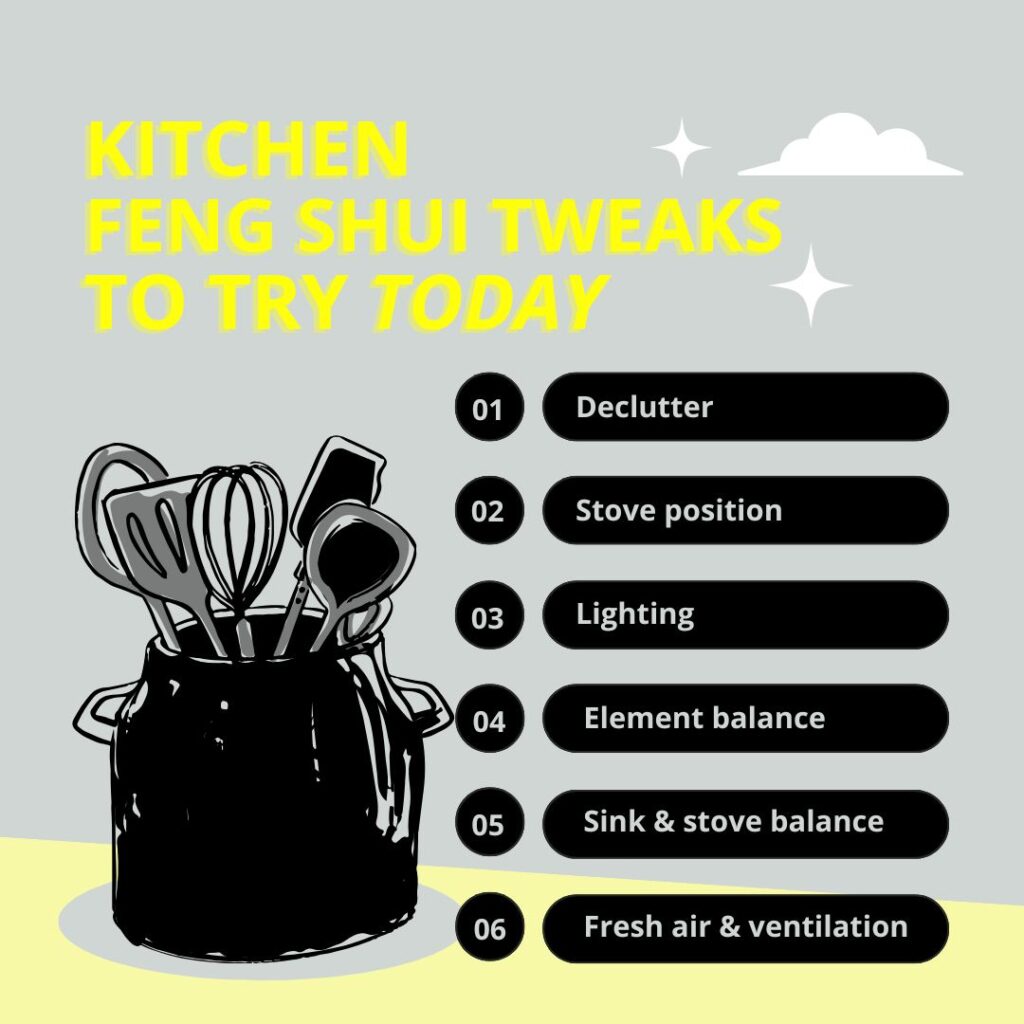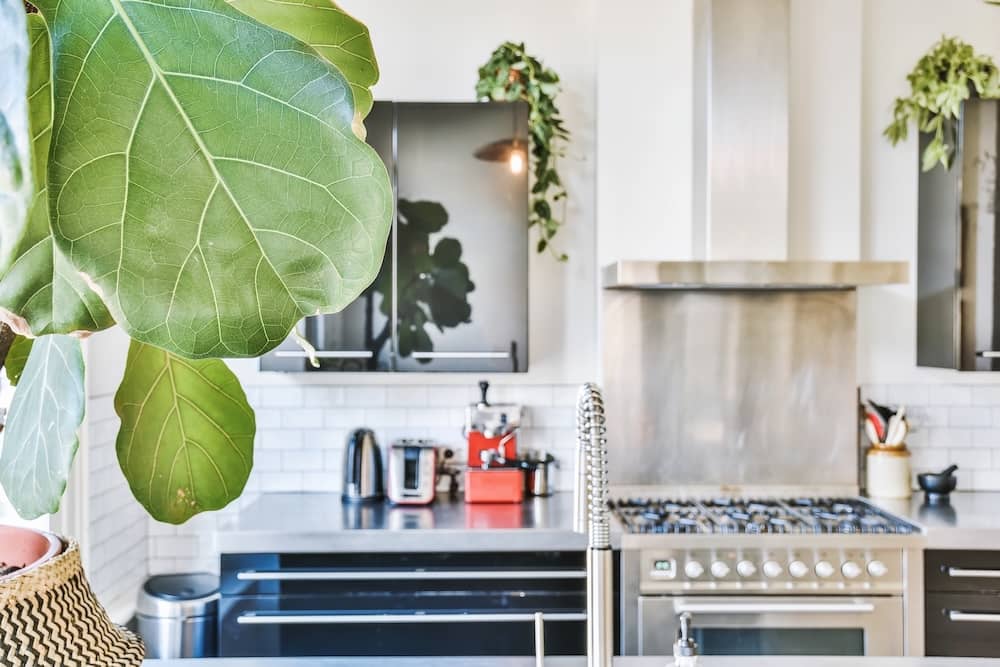The kitchen is often called the heart of the home, but in feng shui, it’s even more than that. This space is believed to influence your health, your finances, and the energy that flows throughout your house. But beyond the ancient wisdom, there’s a practical side too! A feng shui kitchen can help create a safer, healthier, and more enjoyable place to cook, gather, and live.
If you’re looking to bring more balance to your kitchen without tearing the whole thing apart, here are six simple ways to refresh your space and keep it working well for your family.
1. Declutter to Uncover Hidden Problems
In feng shui, clutter blocks the flow of positive energy, making your kitchen feel heavy or stagnant. But clutter also hides things you really don’t want to miss, like leaks, pests, or mold growth. That pile of cleaning supplies under the sink or the packed pantry shelves could be covering more than just expired food.
Start with these key areas:
- Under the sink and behind appliances (where leaks love to hide).
- Inside cabinets and drawers (especially those you haven’t opened in a while).
- Countertops, where too many gadgets can crowd your workspace.
Getting rid of excess items not only lets energy flow but makes it easier to spot issues before they turn costly. For example, catching a small leak under your sink early might cost just $150 to $350 to repair, but if it goes unnoticed and leads to water damage or mold, you could be facing bills in the thousands.

Plus, there’s a mental health benefit. Research from UCLA shows that cluttered spaces lead to higher stress levels, which makes sense when you think about how overwhelming it can feel to work in a crowded kitchen.
2. Position the Stove for Safety and Comfort
In feng shui, the stove symbolizes both health and wealth. Ideally, when you’re cooking, you should be able to see the kitchen door without standing directly in line with it. This position is called the command position, and it helps you feel more in control and at ease while you prepare meals.
Most kitchens don’t make this easy, but there are ways to work around it:
- Install a mirror that reflects the door, allowing you to see anyone entering while you’re cooking.
- If a mirror feels like too much, consider moving small prep stations, like a chopping area, so you’re facing the entrance more often.
Proper stove placement also supports safety and function. Poor ventilation, fire hazards, or incorrect appliance clearances are things that home inspectors frequently check. These can impact not only your comfort but also the long-term safety of your kitchen.
3. Improve Lighting for Better Energy and Resale Appeal
Good lighting is essential in feng shui because it lifts the energy of a space. But it’s also something that makes a big difference when it comes to home value and day-to-day function. According to the National Association of Home Builders, 87% of buyers consider lighting one of the top features in a kitchen.
If your kitchen feels dim or gloomy, here are some easy upgrades:
- Add under-cabinet lighting to brighten up your workspace.
- Replace old bulbs with LEDs that offer better light quality and use less energy.
- Use light curtains or shades that let in more natural light without sacrificing privacy.
Better lighting also helps you spot issues like water stains or worn materials, which are things that can show up on a home inspection report. A well-lit kitchen doesn’t just feel better, it helps keep your space healthy and makes it more appealing to potential buyers.
4. Balance the Five Elements for Comfort and Durability
Feng shui works with five elements (wood, fire, earth, metal, and water) that need to be balanced for the best energy flow. Each plays a role in creating harmony, and most kitchens already have a mix of these. But adding or adjusting elements can improve both the feel and function of your space.
Here’s how you can do it:
- Wood: Add cutting boards, floating shelves, or even a small plant in a wooden pot.
- Fire: Your stove represents fire, but you can add touches of red or orange to bring in more warmth.
- Earth: Use natural stone countertops, clay pots, or ceramic dishes.
- Metal: Stainless steel appliances and cabinet handles cover this element well.
- Water: The sink, of course, represents water, but you can also use blue tones or glassware.
This balance isn’t just about how your kitchen looks. Choosing durable materials, like stone for counters (earth element) or quality metal fixtures, helps the space hold up to daily use. It’s the kind of thing home inspectors notice; durable materials often mean fewer repairs down the road.
5. Harmonize the Sink and Stove to Avoid Conflict
In feng shui, placing the sink (water) directly across from the stove (fire) creates a clash between these two elements. This can lead to tension or conflict within the home, at least from an energy standpoint. But even if you aren’t following feng shui strictly, this arrangement isn’t ideal.
If your kitchen layout has the sink and stove facing off, try this! Add a wooden cutting board, a herb garden, or a ceramic bowl between them. These bring in earth or wood elements to soften the conflict.
From an inspection perspective, the areas around sinks and stoves are common spots where we find leaks, grease buildup, or electrical hazards. Adding these balancing elements can make these zones more functional while aligning with feng shui principles.
6. Freshen the Air with Ventilation and Greenery
Air quality is a big part of feng shui. It represents fresh, flowing energy. But it’s also crucial for health and safety. Cooking releases grease, moisture, and pollutants that can build up in your kitchen air. According to the EPA, indoor air can be two to five times more polluted than outdoor air.
To improve air quality:
- Make sure your range hood vents to the outside and not just back into the room.
- Clean or replace your vent filters regularly.
- Add plants like basil, aloe vera, or spider plants that help filter the air and bring natural energy into the space.
Good ventilation also prevents mold growth and moisture damage, which are common issues home inspectors find in kitchens.

Other Recommended Maintenance to Keep Your Kitchen in Shape
While balancing energy, it’s important not to forget regular kitchen maintenance. These small tasks help protect your home from bigger issues:
- Test GFCI outlets—replacing one can cost between $150 and $300, but it’s essential for preventing electrical shocks.
- Check under-sink plumbing for leaks. A quick fix now can prevent expensive repairs later.
- Clean vent fans and hoods to reduce grease buildup and fire risks.
- Inspect appliance connections like dishwasher hoses for wear or cracks.
Regular upkeep supports both feng shui balance and home safety.
When to Call a Professional
Sometimes, the issues in your kitchen go deeper than what meets the eye. If you notice:
- Lingering moisture smells (possible mold),
- Outdated electrical setups (like missing GFCI outlets),
- Or poor ventilation that leaves your kitchen feeling stuffy,
It’s a good time to schedule a professional home inspection. At PI Home Inspection Services, we help homeowners keep every space safe, functional, and up to code.
Conclusion
A feng shui kitchen is more than just a nice layout. It’s a space that feels right, functions smoothly, and supports your health and home value. From decluttering to balancing elements and improving air quality, these small changes can make a big difference.
Ready to make sure your kitchen is truly working for you? Schedule an inspection with PI Home Inspection Services today to uncover hidden issues and bring lasting balance to your home.

